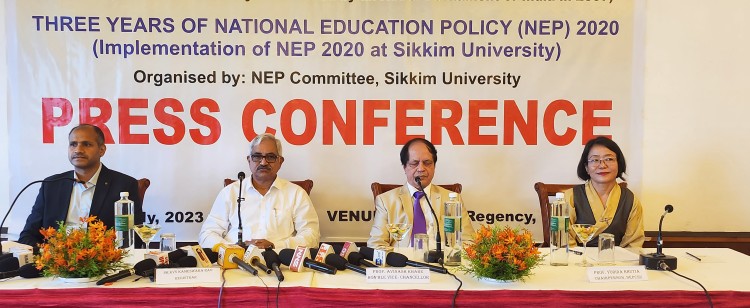




















Saturday, Jul 22, 2023 08:15 [IST]
Last Update: Saturday, Jul 22, 2023 02:33 [IST]
GANGTOK,: Sikkim University vice chancellor Prof. Avinash Khare has maintained that since the implementation of National Education Policy (NEP) 2020, Sikkim University has been in the forefront of implementing the national policy. Sikkim University has shown proactive engagement with NEP-related discussions since the release of the draft policy in 2019, he said on Friday.
The Sikkim University vice chancellor was addressing the media here on the occasion of the third year of National Education Policy (NEP) 2020.
“We are here today to celebrate the third anniversary of NEP 2020. The policy was started by the Union Cabinet of India on July 29, 2020, with Dr. K Kasturirangan as the chairperson. The policy outlines the vision of the new education system of India. The idea was to revamp the education system, as it is necessary with the change in time. The last revamp of the education policy was in 1986,” expressed Prof. Khare.
Prior to the implementation of NEP 2020, suggestions were also taken from the general public and the education policy was thoroughly scrutinised. In September 2021, Sikkim University established a committee comprising 15 dedicated members for the implementation of NEP 2020.
Additionally, 15 sub-committees were formed on October 5, 2021, with representation from faculty members across the departments and various levels. These sub-committees helped in discussing and brainstorming various components of NEP 2020.
Since then, several activities were conducted to support the NEP implementation process. These included organizing webinars to familiarize faculty, students, and stakeholders with the policy, entering into a MoU with the Centre for Educational and Social Studies (CESS), Bangalore for guidance and support, and conducting capacity-building workshops to enhance stakeholders' knowledge and skills in NEP implementation, shared Prof. Khare.
NEPCSU chairperson Prof Yodida Bhutia, highlighting the progress of NEP 2020 in Sikkim University, informed that Sikkim University was talking about NEP 2020 since 2019, when the 300-page draft document was introduced. She further stated that the NEP 2020 is now a 60-page document.
“Sikkim University is the first university in the region to introduce and adopt the four-year undergraduate course in 2022. It will be a historic moment as in July 2024 Sikkim University will have the first honors and research batch graduates. The four-year undergraduate course allows exit and entry, so that students, especially women, who are unable to continue their course/or take a gap can take advantage, allowing flexibility in their education journey. This will also be beneficial as there will be no or very less dropouts. The fourth year honors and research graduates can also directly apply for PhD,” said Yodida.
The university has also undertaken the revision of undergraduate and postgraduate curricula based on the National Credit Framework (NCrF), ensuring students earn comparable or more credits compared to other institutions implementing NEP 2020.
The curricula should be learner-centric and outcome-based. Furthermore, the university has adopted a learning outcome-based curriculum, ensuring that syllabi for all courses at both undergraduate and postgraduate levels are designed to meet specified learning outcomes, informed the vice chancellor.
It was further informed that Sikkim University has registered with the National Academic Depository and the Academic Bank of Credits, which securely stores and provides easy access to academic records. The university has also implemented UGC guidelines to offer 40 per cent courses of the entire programme through MOOs on the SWAYAM platform, with provisions for credit transfer.
“This will lead to minimum to no fake mark sheet rackets that are common in India. It will also be beneficial as it will be easier for students to transfer between universities. So far, 12960 students have already registered,” said the VC.
Sikkim University is actively preparing to internationalize higher education by welcoming foreign students. Regulations for internationalization have been developed, aiming to foster global competencies among faculty and students. “Through this, students will get exposure and opportunity to go abroad and students from abroad can come to Sikkim University,” said Prof. Yodida.
The university is also implementing the Professor of Practice initiative, inviting industry experts to enhance the quality of education. People with experience and without NET can come and teach students, based on their experience. The aim is to bring practicals to the classroom. We have opened applications for journalism, as of now, informed VC Khare.
Additionally, a Research and Development Cell has been established to boost research productivity and collaboration. The university is committed to advancing research and innovation, it was informed.
An NEP 2020 Sarathi has also been established where we have appointed three students. UGC will directly contact the Sarathis, informed Yodida.
Sikkim University's proactive approach, collaborative efforts, and successful implementation of NEP 2020 highlight its commitment to transforming higher education and creating an inclusive, quality-driven learning environment for its students. The main challenges in the beginning were logistic support and infrastructure. Structuring the programme was also challenging but we conducted various seminars and webinars with CESS Bangalore for guidance, it was mentioned.
Notably, Sikkim University offers courses on indigenous and oriental languages like Chinese. Furthermore, the university is planning to introduce Buddhist studies. The programme was proposed by the State government and the university is planning to sign a MoU with Namgyal Institute of Tibetology.
It was further informed that the term of vice chancellor Prof. Avinash Khare has been extended to July 31, 2024.
It was also informed that the three non-laboratory based schools will be shifted to the permanent campus at Yangang, South Sikkim by the end of the year. So far, three languages departments i.e. Bhutia, Limboo and Lepcha were shifted to the Yangang campus last year.
